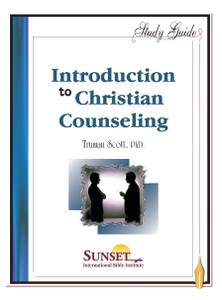
Basics of Christian Counseling (Wilson) - Course Study Guide (Print)
Sunset Institute PressThe textbooks used in this course were selected because we consider them some of the best and are well adapted to this course of study. The three books The Power of Biblical Thinking, by Ken Wilson; Telling Yourself the Truth, by William Backus and Marie Chapian; and, Happiness is a Choice by Frank B. Minirth and Paul D. Meier contain a wealth of knowledge which will increase your understanding the Basics of Christian Counseling. The diagrams and charts will enhance your study and help you to understand the over all content of this study. As with all books written by men, there may be some things with which you and I would not agree. The principle, “use what is good and discard what is not good” applies to all textbooks used with our courses. Please be wise enough to discard any and all teaching that is not biblical.
LESSON TWO. Competent to Counsel . . . . . . . . . . . . . . . . . . . . . . . . . . . 8
LESSON THREE. The Truth about Self-control . . . . . . . . . . . . . . . . . . . . . . 17
LESSON FOUR. How to Deal with Anger Issues . . . . . . . . . . . . . . . . . . . . 27
LESSON FIVE. How to Create a Positive Self-worth . . . . . . . . . . . . . . . . 36
LESSON SIX. Communication and Counseling Techniques . . . . . . . . . . 44
LESSON SEVEN. The Basic Principles of Crisis Counseling . . . . . . . . . . . . 52
LESSON EIGHT. The Authority and Reliability of Scripture . . . . . . . . . . . . 65
LESSON NINE. The Design and Order of God’s Creation . . . . . . . . . . . . 73
LESSON TEN. A Review of Popular Counseling Theories . . . . . . . . . . . 81
LESSON ELEVEN. The Counselor and Christian Ethics . . . . . . . . . . . . . . . . . 89
LESSON TWELVE. The Counselor and the Holy Spirit . . . . . . . . . . . . . . . . . . 98
The power of the mind continues to amaze even the casual observer. The brain is much like a computer. It has access to a personal library of thousands of thoughts and pictures, ready to expose them on the imaginary monitor screen in our heads at a moment’s notice. The mind can recall, at will, any programmed belief system that is in that personal library. Some of the belief systems are true and some are false. The brain does amazing things but appears unable to distinguish the difference between a truth and a lie. If a person believes that something is true, the brain will accept it as truth. All that is required is repetition of that belief for the brain to record it as truth for all time. Just like a computer’s hard drive, whatever you have saved in your mind will stay there until you change it. Most belief systems are formed in childhood. Once accepted, these beliefs are recorded as true even if they are not. “Belief Systems” then, are those collections of
beliefs that the brain has recorded (after much repetition) and recalls at will because we use them when needed and believe them to be true. These belief systems have a direct relationship to how we see our world and how we think our world sees us.
- Binding:
- Comb Bound
- Copyright:
- 2003
- Language:
- English
- Pages:
- 106
- Publisher:
- Sunset International Bible Inst.






